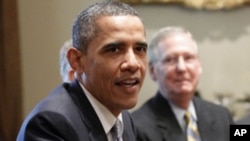President Barack Obama along with several Republican and Democratic congressional leaders held a fourth round of negotiations in as many days Wednesday at the White House aimed at achieving a deficit reduction and debt compromise.
With media reports filled with various versions of what has been said behind closed doors, based on anonymous White House and congressional sources, reporters pressed White House briefing spokesman Jay Carney for specifics.
They got none, but Carney did address a proposal by Senate Minority Leader Mitch McConnell for a procedurally-complex legislative tactic that would have essentially transferred authority, and political responsibility, for raising the debt ceiling from Congress to the president.
McConnell proposed passing legislation to allow Mr. Obama to raise the debt limit in three stages by $2.5 trillion, through the 2012 presidential election year, but requiring the president to list spending cuts at least as high as increases in the debt ceiling.
The senator described this as a way for Republicans to avoid being politically damaged by a worsening economy, because under the plan lawmakers could avoid voting against a debt ceiling increase.
Carney called the proposal an acknowledgment by Republicans that there is no alternative to raising the debt limit. He did not reject it outright but said Mr. Obama remains focused on achieving the largest possible deficit reduction deal. "The linkage that was created that tied significant deficit reduction to this deadline, was so that we could work together, roll up our sleeves and do this. Well the president is ready and willing to do that, he is willing to make compromises, he is willing to go big here," he said.
McConnell spoke on the Senate floor before he and other lawmakers went to the White House for their fourth round of talks with Mr. Obama. "Americans don't want tax hikes, they don't want phony spending cuts, they don't want a debt disapproval plan, and they don't want us to default on our debts. They want real cuts, and real reform, now," he said.
In a CBS News television interview on Tuesday, President Obama had this response to McConnell's statement the day before that a solution to the nation's fiscal mess was unobtainable with Mr. Obama in the White House. "You know, Mr. McConnell said, I think the day I was elected, that his job was to try to see me beat. I think what the American people are looking for is not that kind of partisan politics," he said.
In addition to the president, his advisers, and lawmakers the White House negotiations have included Treasury Secretary Timothy Geithner, who warned of the dire consequences of a debt default on August 2.
In testimony to a congressional committee on Capitol Hill on Wednesday, Federal Reserve Chairman Ben Bernanke said a default would have wide-ranging impacts. "Clearly if we went so far as to default on the debt it would be a major crisis," he said.
White House spokesman Carney said Wednesday's talks would look at areas where there is agreement, or where agreement is near, as well as issues on which significant negotiations remain.
Asked if Mr. Obama would rule out a very short stop gap measure, if negotiators were on the edge of a larger compromise, Carney said "there is enough time to get this done" adding the president believes there is momentum toward achieving a significant balanced deficit reduction package.
Obama, Lawmakers Hold Round Four of Debt Talks
- By Dan Robinson





